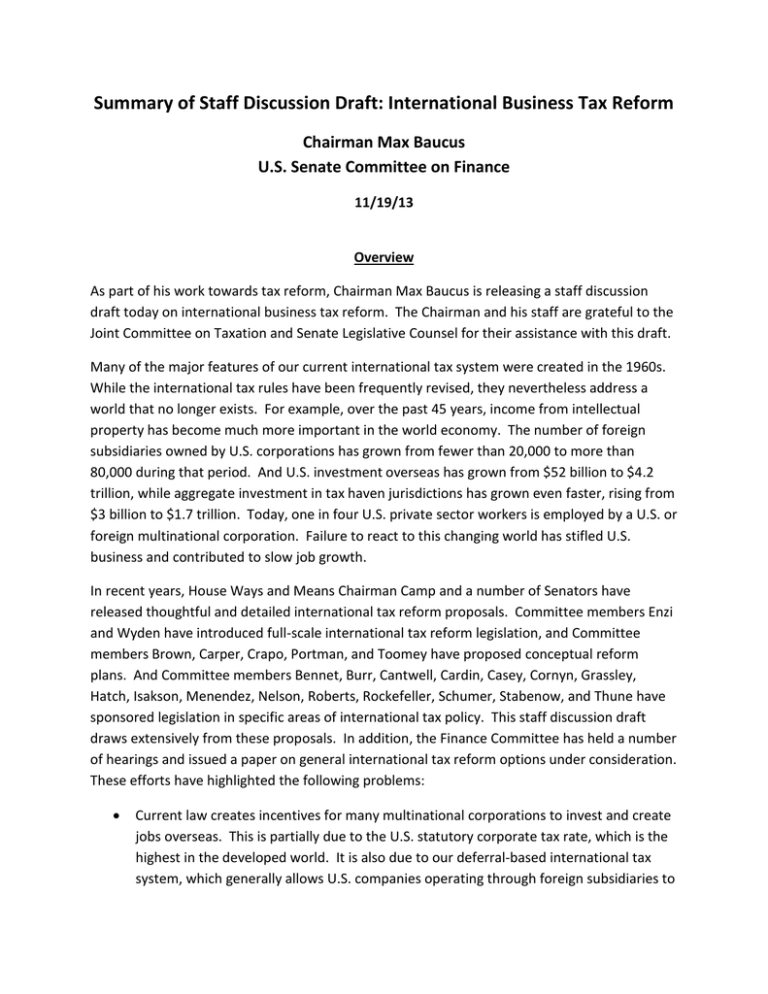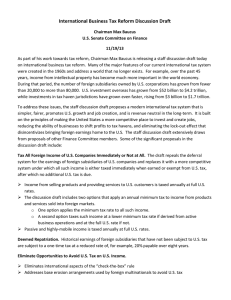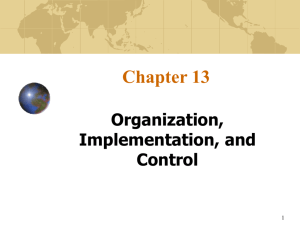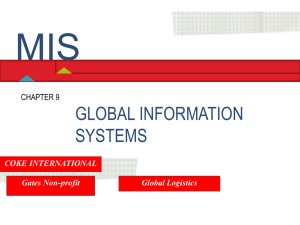Summary of Staff Discussion Draft: International Business Tax Reform
advertisement

Summary of Staff Discussion Draft: International Business Tax Reform Chairman Max Baucus U.S. Senate Committee on Finance 11/19/13 Overview As part of his work towards tax reform, Chairman Max Baucus is releasing a staff discussion draft today on international business tax reform. The Chairman and his staff are grateful to the Joint Committee on Taxation and Senate Legislative Counsel for their assistance with this draft. Many of the major features of our current international tax system were created in the 1960s. While the international tax rules have been frequently revised, they nevertheless address a world that no longer exists. For example, over the past 45 years, income from intellectual property has become much more important in the world economy. The number of foreign subsidiaries owned by U.S. corporations has grown from fewer than 20,000 to more than 80,000 during that period. And U.S. investment overseas has grown from $52 billion to $4.2 trillion, while aggregate investment in tax haven jurisdictions has grown even faster, rising from $3 billion to $1.7 trillion. Today, one in four U.S. private sector workers is employed by a U.S. or foreign multinational corporation. Failure to react to this changing world has stifled U.S. business and contributed to slow job growth. In recent years, House Ways and Means Chairman Camp and a number of Senators have released thoughtful and detailed international tax reform proposals. Committee members Enzi and Wyden have introduced full-scale international tax reform legislation, and Committee members Brown, Carper, Crapo, Portman, and Toomey have proposed conceptual reform plans. And Committee members Bennet, Burr, Cantwell, Cardin, Casey, Cornyn, Grassley, Hatch, Isakson, Menendez, Nelson, Roberts, Rockefeller, Schumer, Stabenow, and Thune have sponsored legislation in specific areas of international tax policy. This staff discussion draft draws extensively from these proposals. In addition, the Finance Committee has held a number of hearings and issued a paper on general international tax reform options under consideration. These efforts have highlighted the following problems: • Current law creates incentives for many multinational corporations to invest and create jobs overseas. This is partially due to the U.S. statutory corporate tax rate, which is the highest in the developed world. It is also due to our deferral-based international tax system, which generally allows U.S. companies operating through foreign subsidiaries to choose if and when foreign profits are subject to U.S. tax. This can result in lower effective tax rates on U.S. companies investing abroad rather than in the United States. • Current law allows multinational corporations (both domestic and foreign) to shift earnings to tax havens and to take advantage of differences between U.S. and foreign laws to reduce their U.S. tax bill. • Current law makes it difficult for U.S.-based multinational businesses to compete with foreign-based multinationals. U.S. businesses are held back by tax rules that are complex, inefficient, and unfair. In addition, many foreign multinationals are based in countries with significantly lower corporate tax rates and with dividend exemption systems instead of the deferral and credit-based system that the United States uses. These impediments to competitiveness hurt job creation and economic growth. • Current law creates incentives for U.S.-based multinationals to keep the earnings of foreign subsidiaries offshore and not repatriate such earnings to the United States (the lock-out effect). Goals of the Staff Discussion Draft This staff discussion draft proposes a modern, competitive international tax system that promotes U.S growth and job creation and is simpler and fairer than the current system. Specifically, the discussion draft promotes the following objectives: • Reduce incentives for U.S. and foreign multinationals to invest in, or shift profits to, lowtax foreign countries rather than the United States. • Reduce incentives for U.S.-based businesses to move abroad, whether by reincorporating abroad or merging with a foreign business. • Increase the ability of U.S. businesses to compete against foreign businesses in foreign markets. • End the lock-out effect by taxing the foreign income of U.S. businesses either immediately when earned or not at all. • Simplify the international tax rules so that firms with the most sophisticated tax advisors are not advantaged. 2 Summary of the Staff Discussion Draft The staff discussion draft advances these goals through the reforms summarized below. While the Chairman believes tax reform as a whole should raise significant revenue for deficit reduction, the package of reforms in this staff discussion draft is intended to be revenueneutral in the long-term (i.e., in a steady state). Some figures below are bracketed because we expect to adjust them or other aspects of the draft to meet this revenue goal. These reforms are also intended to be coupled with a significant reduction in the corporate tax rate that is financed by broadening the corporate tax base in a manner that is revenue neutral in the longterm. These proposals are meant to be considered as a package and not as stand-alone proposals. Tax All Foreign Income of U.S. Companies Immediately or Not at All. The staff discussion draft ends the lock-out effect and replaces the deferral system with a new, more competitive system under which all income of foreign subsidiaries of U.S. companies is taxed immediately when earned or is exempt from U.S. tax, after which no additional U.S. tax is due. Specifically: • Passive and highly-mobile income is taxed annually at full U.S. rates • Income from selling products and providing services to U.S. customers is taxed annually at full U.S. rates with limited exceptions • The staff discussion draft includes two options for taxing income from products and services sold into foreign markets: o A minimum tax that immediately taxes all such income at [80%] of the U.S. corporate tax rate with full foreign tax credits, coupled with a full exemption for foreign earnings upon repatriation o A minimum tax that immediately taxes all such income at [60%] of the U.S. corporate rate if derived from active business operations but at the full U.S. rate if not, coupled with a full exemption for foreign earnings upon repatriation • Earnings of foreign subsidiaries from periods before the effective date of the proposal that have not been subject to U.S. tax are subject to a one-time tax at a reduced rate of, for example, 20%, payable over eight years • Unless otherwise noted, credits are allowed for taxes paid to foreign jurisdictions to the extent the associated income is subject to U.S. tax 3 Eliminate Opportunities to Avoid U.S. Tax on U.S. Income. The staff discussion draft: • Limits interest deductions for domestic companies to the extent that the earnings of their foreign subsidiaries are exempt from U.S. tax and to the extent that the domestic companies are over-leveraged when compared to their foreign subsidiaries • Limits income shifting through intangible property transfers • Denies deductions for related party payments arising in a base erosion arrangement • Repeals the domestic international sales corporations rules • Limits the extent to which foreign tax credits can eliminate U.S. tax on income from investments in foreign companies that are not controlled foreign corporations • Restores withholding taxes on interest paid by domestic corporations to residents of countries not providing similar benefits for U.S. investors • Prevents foreign investors from using partnerships to avoid U.S. taxation Modernize and Simplify Other International Tax Rules. The staff discussion draft: • Eliminates parts of the “check-the-box” rule under which U.S. multinationals can disregard certain foreign subsidiaries for U.S. tax purposes, but does not change the domestic application of the “check-the-box” rules • Simplifies the foreign tax credit rules • Apportions interest expense on a worldwide basis for purposes of matching interest expense to income generated by borrowed funds • Modernizes the rules applying to overseas banking and insurance businesses • Simplifies the rules for taxing passive foreign investment companies • Modernizes the rules addressing foreign investment in U.S. real estate Unaddressed Issues and Request for Comments Comments are requested on all aspects of the staff discussion draft as well as other areas of international business tax reform. Specific requests for comments on certain narrow technical and policy issues are contained in a separate document issued today by the Chairman’s staff. With respect to more general and conceptual issues, comments on the additional issues listed 4 below are of particular interest. All comments should be submitted to tax_reform@finance.senate.gov. While comments will be accepted at any time, the staff requests comments by January 17, 2014, in order to be able to give them full consideration. The issues of particular interest are listed below: • The pros and cons of the two options for taxing foreign market activities of foreign subsidiaries of U.S. businesses. • The Chairman’s staff continues to consider the overall approach in Chairman Camp’s Option C. The staff views Option C, including the proposal regarding the taxation of intangible property held by domestic corporations, as a potential alternative framework for international tax reform. Comments are requested on the relative merits of Chairman Camp’s Option C as compared with the proposals in this staff discussion draft. • The staff discussion draft does not change the current treatment of foreign branches (that is, overseas business conducted directly by U.S. corporations as opposed to those undertaken through a foreign subsidiary). Comments are requested on the merits of this approach and what transition rules should apply if foreign branches are treated like foreign subsidiaries. • The Chairman’s staff is considering additional ways to address U.S. base erosion by foreign multinational companies beyond the proposals in the staff discussion draft. Under current law, foreign multinational corporations have substantial opportunities to avoid taxation through financing and licensing arrangements involving their U.S. subsidiaries. For example, foreign multinationals can take advantage of differences between U.S. and foreign tax laws to qualify for income tax treaty benefits while paying little or no U.S. or foreign tax on income earned in the United States. Comments are requested regarding appropriate rules to limit such opportunities beyond the limitations imposed by current law or proposed in the staff discussion draft. For example, the Chairman’s staff is considering whether deductions for payments to related foreign companies should be disallowed if the payment is taxed at a low rate in the foreign jurisdiction or whether to provide rules subjecting to U.S. tax income generated by customer-based intangibles related to sales in the United States by foreign multinationals. • U.S. businesses have made and continue to make significant decisions based on current law. Businesses should be allowed reasonable opportunities to transition to the modernized international tax system. Comments are requested regarding appropriate transition rules and effective dates that allow for an equitable and orderly transition 5 that is neither punitive nor results in windfalls. For example, the provisions are generally effective for taxable years after December 31, 2014, but comments are requested regarding whether more time would be necessary to effectively implement any provisions of the staff discussion draft. • While not a uniquely international provision, the Chairman’s staff is considering whether the current law “thin capitalization” rules (addressing domestic companies that have excessive debt owed to foreign affiliates) should be tightened and expanded to apply to interest on all debt owed by a domestic corporation. Comments are requested on the need for such a rule and on the appropriate scope and mechanics of such a rule. • The Chairman’s staff is considering a temporary transition rule to allow U.S. multinationals to bring intangible property held by their foreign subsidiaries back to the United States on a tax neutral basis. Comments are requested regarding the appropriate scope and mechanics of such a provision. • The staff discussion draft does not separately address the taxation of foreign subsidiaries doing business in the U.S. territories. Comments are requested regarding the appropriate scope of U.S. taxation of such territory operations in light of the changes proposed in the staff discussion draft. • The staff discussion draft does not address the international tax rules addressing individuals, whether for U.S. citizens living overseas or foreign nationals moving to the United States. The Chairman’s staff is considering reforms to simplify the rules in this area while appropriately taxing such individuals. Comments are requested regarding the scope and mechanics of reforms in this area. • Other opportunities for simplifying the international tax system in a manner consistent with the proposed changes. 6




